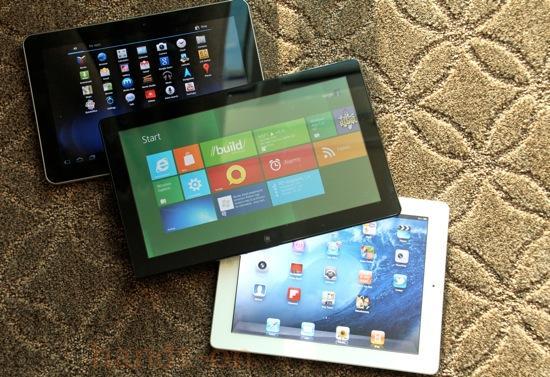
So Microsoft finally came forward and showed the next generation of Windows. Sure, this isn’t the first time we’ve seen the new OS, but this time around it was a far more in-depth look, especially when it comes to both hardware and software. While nothing is consumer-ready right now, it’s a good way for Microsoft to show the world what they’re working on, and how groundbreaking it is for Microsoft as a whole. Let’s face it – Windows 8 is indeed groundbreaking for Microsoft. It’s a huge departure from previous versions of Windows, and it shows that Microsoft is ready to take the Metro UI (which, incidentally, was Microsoft’s emergence into the current market for smartphones) and make it a household name in a year’s time. But, that’s the kicker, isn’t it? That “years’ time” piece. Because we know how quickly the technology market moves, and we know that some strategies work better than others. Is Microsoft shooting themselves in the foot by showing off Windows 8 so soon?
I’ve already talked about how I don’t want Windows 8, at least not in the sense that it’s Windows. And, when I said that, I said that I don’t want Windows 8 on a tablet. And I mean it. Right now, the state of Windows on a tablet is . . . Well, it’s not good. Windows on a tablet is Windows on a tablet, but the problem comes in the fact that the OS they’ve put on that tablet isn’t meant for a mobile device. At least, not in my eyes. Windows is meant for the PC, or notebook or netbook. That’s it. Windows 8 looks to change that, slightly, with the Metro UI and focus on touch interaction, especially with those Tiles and Hubs. Apps rule the game, and Windows is ready to embrace them in Windows 8. On the flip-side, Taylor is pretty excited about Windows 8 (as much as the Linux-loving Taylor can be, that is), and that’s saying something.
After reading his article yesterday, I took another look at Windows 8 and then trudged around the Internet to see what others were saying about the OS. Some folks are excited about it, while others are focusing on Windows 8 on tablets, leaving out the rest. While that’s a fine conversation to have, about Windows 8 on tablets, that’s not what Microsoft is focusing on at all. Everyone (and I mean everyone) knows that right now, Apple holds dominion over the tablet market. While manufacturers try their best to create magnificent products, it’s Apple that’s still at the head of the game. So Microsoft is pointing out how Windows 8 works on all sorts of products, and that’s the right methodology.
But, maybe they’ve jumped the gun. And yes, this is about strategy. Because we know that Windows 8 is still about a year out, maybe just a little less. That’s one whole year, from BUILD a couple of days ago. A lot can happen in a year. Technology isn’t going to slow down for Microsoft. And while we know that Microsoft is obviously going to continue to innovate in their own way with their Windows 8 development, and we know that they won’t release too many “old” devices running the OS by the time it launches, but everyone else is going to keep innovating behind the scenes, and keep surprising the market with their releases. We can sit here and compare Microsoft’s strategy with Apple, but that’s been done to death. The two companies do things differently, and they do things that they believe work for them. That’s great. But, while we’re all sitting here excited to see Windows 8 on a tablet meant for portability, we have to wait a year before we can buy it, if we still want to buy it.
There’s no telling what the mobile market will look like in a year. It may look completely different from today. Actually, it will look completely different from today. And while we can pretty much guarantee in some fashion or another that Windows 8 will be a “hit” for home computers, the mobile market will be an entirely different story, especially when it comes to tablets. Obviously Apple will have a new iPad out, and there’s no telling how many Android-powered tablets will find their way to the market by then, with plenty of updates from Google to accompany (most) of them. The market is going to change, and Microsoft is already showing their hand for those distant days. Will it work for Microsoft? We’ll just have to wait and see.